Bombay
Author: Cyril Demaegd
Publisher: Asmodee / Ystari
Year: 2009
review by

| x |
|
|
|
|
|
|
|
|
|
|
|
|
|
|
|
|
|
|
|
|
|
|
|
|
|
|
|
|
|
|
|
|
|
|
|
|
|
|
|
|
|
|
|
|
|
|
|
|
|
|
|
|
|
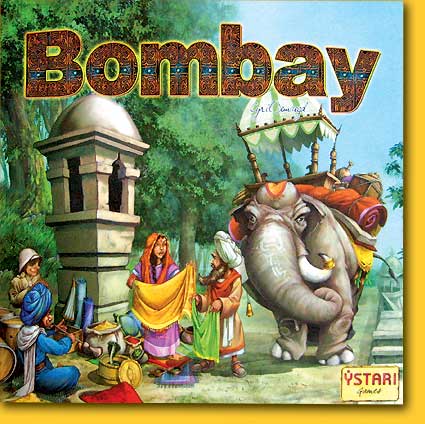 |
With our elephants we travel through India, to purchase goods on the market, and sell them for profit in the surrounding cities. Sometimes we are prepared to make a detour, since the prices are different in each city! On our journey we can use part of our profit to build prestigious palaces that are not only the symbols of our own status, but are also used as toll booths to collect toll from our travelling competitors. The merchant that has gathered the largest fortune wins the game!
|
|
|
|
|
|
|
|
|
|
|
| x |
|
|
|
|
|
|
|
|
|
|
|
|
|
|
|
|
|
|
|
|
|
|
|
|
|
|
|
|
|
|
|
|
|
|
|
|
|
|
|
|
|
|
|
|
|
|
|
|
|
|
|
|
|
|
The game plays in a predetermined number of rounds, depending on the number of players. Each round, a player may carry out three actions. Four cities in different colours are depicted on the board, as well as eight trading posts in four colours.
Also on the board is the market square, with three stands with different prices. At the beginning of each round, nine goods cubes are drawn randomly from the bag.
|
|
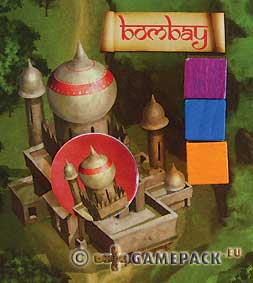 |
| x |
|
|
|
|
|
|
|
|
|
|
|
|
|
|
|
|
|
|
|
|
|
|
|
|
|
|
|
|
|
|
|
|
|
|
|
|
|
|
|
|
|
|
|
|
|
|
|
|
|
|
|
|
|
 |
x |
The most-represented good (or goods) is placed on the first market stand, the second one on the second stand, and the scarcest good on the third stand.
|
|
|
|
|
|
|
|
|
|
| x |
|
|
|
|
|
|
|
|
|
|
|
|
|
|
|
|
|
|
|
|
|
|
|
|
|
|
|
|
|
|
|
|
|
|
|
|
|
|
|
|
|
|
|
|
|
|
|
|
|
|
|
|
|
| In their turn, a player can move his elephant across the board. This costs one action per movement. Also, he can purchase goods from the market. He can only buy goods matching the colour of the trading post where his elephant is currently located! Goods from the first stand cost one action and one rupee, from the second stand two actions and one rupee, and from the third stand two actions and two rupees. The purchased goods are stored in the baskets on the elephant's back, which has room for two goods. |
|
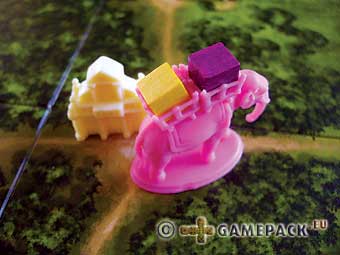 |
| x |
|
|
|
|
|
|
|
|
|
|
|
|
|
|
|
|
|
|
|
|
|
|
|
|
|
|
|
|
|
|
|
|
|
|
|
|
|
|
|
|
|
|
|
|
|
|
|
|
|
|
|
|
|
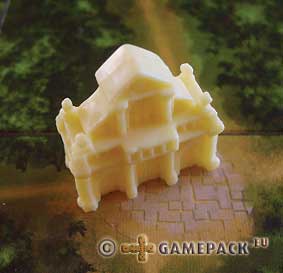 |
|
Another option is to build a palace on an empty site. This costs one action, and a good of your choice. If another player's elephant passes a palace, the owner receives one rupee from the bank. |
|
|
|
|
|
|
|
|
|
|
|
| x |
|
|
|
|
|
|
|
|
|
|
|
|
|
|
|
|
|
|
|
|
|
|
|
|
|
|
|
|
|
|
|
|
|
|
|
|
|
|
|
|
|
|
|
|
|
|
|
|
|
|
|
|
|
|
The last option is to sell goods in a city, which also costs one action. Each city contains a column of three cubes to illustrate the demand in this city. If you sell a good of the same colour as the top demand cube, you receive four rupee. The middle good scores three rupee, and the bottom good one rupee and a client token. The demand cube is relocated to the bottom position; by selling this good, the demand has decreased. In addition to the money, the player may also take a city token in the colour of the city. These tokens are scored at the end of the game.
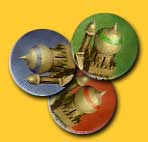
|
|
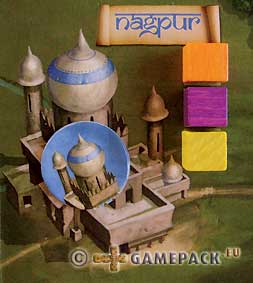 |
| x |
|
|
|
|
|
|
|
|
|
|
|
|
|
|
|
|
|
|
|
|
|
|
|
|
|
|
|
|
|
|
|
|
|
|
|
|
|
|
|
|
|
|
|
|
|
|
|
|
|
|
|
|
|
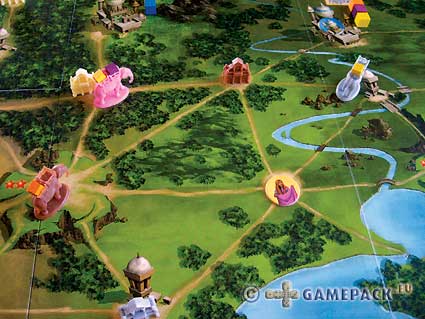 |
|
The game ends after a predetermined number of rounds. First, some bonuses are distributed: everybody who has three different city tokens gets four rupee, and if you have all four different tokens you get eight rupee. Subsequently, all players add the number of palaces they built to the number of client tokens they collected; bonuses are awarded to players with the highest totals. The player with the largest fortune wins the game!

|
|
|
|
|
|
|
|
|
| x |
|
|
|
|
|
|
|
|
|
|
|
|
|
|
|
|
|
|
|
|
|
|
|
|
|
|
|
|
|
| x |
|
|
|
|
|
|
|
|
|
|
|
|
|
|
|
|
|
|
|
|
|
|
|
|
|
|
|
|
|
| x |
|
|
|
|
|
|
|
|
|
|
|
|
|
|
|
|
|
|
|
|
|
|
|
|
|
|
|
|
|
|
|
|
|
|
|
|
|
|
|
|
|
|
|
|
|
|
|
|
|
|
|
|
|
 |
|
|
|
|
|
|
|
|
|
|
|
|
|
|
|
|
|
|
|
|
|
|
|
|
|
|
|
|
|
|
|
|
|
|
|
|
|
|
|
|
|
|
|
|
|
|
|
|
|
| Bombay is a relatively simple game, with more depth than you would think at first sight. The three actions per turn are limiting, you always want to do more than you can. And, you are constantly at risk that another player beats you to the punch: the market can run out of goods, which is annoying if you have been on your way to a trading post for two turns... |
|
|
|
|
|
|
|
|
| x |
|
|
|
|
|
|
|
|
|
|
|
|
|
|
|
|
|
|
|
|
|
|
|
|
|
|
|
|
|
|
|
|
|
|
|
|
|
|
|
|
|
|
|
|
|
|
|
|
|
|
|
|
|
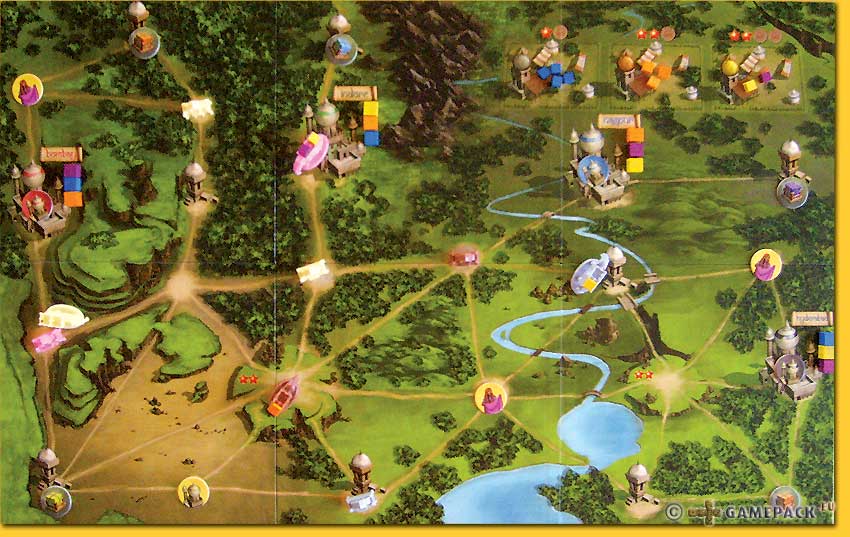 |
|
| x |
|
|
|
|
|
|
|
|
|
|
|
|
|
|
|
|
|
|
|
|
|
|
|
|
|
|
|
|
|
|
|
|
|
|
|
|
|
|
|
|
|
|
|
|
|
|
|
|
|
|
|
|
|
| It also happens quite frequently that somebody sells a cube in a city just before you get the chance, thus reducing the value of this cube. And the city tokens run out quickly, which is also something to keep in mind. Of course, during your travels, you don't want to make your competitors too rich, so you try to avoid their palaces, sometimes resulting in huge detours. |
|
|
|
|
|
|
|
|
| x |
|
|
|
|
|
|
|
|
|
|
|
|
|
|
|
|
|
|
|
|
|
|
|
|
|
|
|
|
|
|
|
|
|
|
|
|
|
|
|
|
|
|
|
|
|
|
|
|
|
|
|
|
|
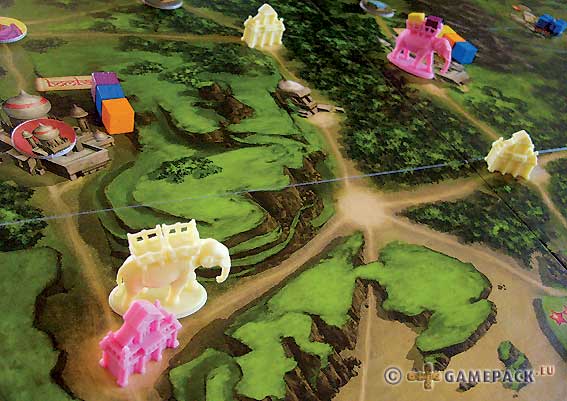 |
|
You are constantly watching the other players' every move, which makes it a very interactive game. Many different roads might lead to victory: consequently deliver the most valuable goods to the cities for the highest price, or collect as many palaces and client tokens as possible for the rather significant bonus at the end of the game, or collect the compete set of city tokens. |
|
|
|
|
|
|
|
|
| x |
|
|
|
|
|
|
|
|
|
|
|
|
|
|
|
|
|
|
|
|
|
|
|
|
|
|
|
|
|
|
|
|
|
|
|
|
|
|
|
|
|
|
|
|
|
|
|
|
|
|
|
|
|
|
Another good strategy is to build a palace on a really busy location; the other players can't avoid to pass through every now and then, the money keeps flowing in, and it's not even your turn! All these strategies are worth a try, which makes it attractive to play Bombay over and over again. Add to this the fact that a game only takes an hour, and you have all the required elements for a fine game!
© 2009 Barbara van Vugt
Bombay, Cyril Demaegd, Asmodee / Ystari, 2009 - 2 to 5 players, 10 years and up, 30 - 60 minutes
|
|
|
|
|
|
|
|
|
  |
|
|
|
|
|
|
|
|
|
|
|
|
|
|
|
|
|
|
|
|
|
|
|
|
|
|
|
|
|
|
|
|
|
|
|
|
|
|
|
|
|
|
|
|
|
|
|
|
|
  |
|
|
|
|
|
|
|
|
|
|
|
|
|
|
|
|
|
|
|
|
|
|
|
|
|
|
|
|
|
|
|
|
|
|
|
|
|
|
|
|
|
|
|
|
|
|
|
|
|
  |
'forgettable' game that takes too long for what it is |
|
|
|
|
|
|
|
|
|
|
|
|
|
|
|
|
  |
|
|
|
|
|
|
|
|
|
|
|
|
|
|
|
|
|
|
|
|
|
|
|
|
|
|
|
|
|
|
|
|
|
|
|
|
|
|
|
|
|
|
|
|
|
|
|
|
|
  |
|
|
|
|
|
|
|
|
|
|
|
|
|
|
|
|
|
|
|
|
|
|
|
|
|
|
|
|
|
|
|
|
|
|
|
|
|
|
|
|
|
|
|
|
|
|
|
|
|
| x |
|
|
|
|
|
|
|
|
|
|
|
|
|
|
|
|
|
|
|
|
|
|
|
|
|
|
|
|
|
|
|
|
|
|
|
|
|
|
|
|
|
|
|
|
|
|
|
|
|
|
|
|
|
| x |
|
|
|
|
|
|
|
|
|
|
|
|
|
|
|
|
|
|
|
|
|
|
|
|
|
|
|
|
|
|
|
|
|
|
|
|
|
|
|
|
|
|
|
|
|
|
|
|
|
|
|
|
|
 |
|
|
|
|
|
|
|
|
|
|
|
|
|
|
|
|
|
|
|
|
|
|
|
|
|
|
|
|
|
|
|
|
|
|
|
|
|
|
|
|
|
|
|
|
|
|
|
|
|
 |
|
|
|
|
|
|
|
|
|
|
|
|
|
|
|
|
|
|
|
|
|
|
|
|
|
|
|
|
|
|
|
|
|
|
|
|
|
|
|
|
|
|
|
|
|
|
|
|
|
| x |
|
|
|
|
|
|
|
|
|
|
|
|
|
|
|
|
|
|
|
|
|
|
|
|
|
|
|
|
|
|
|
|
|
|
|
|
|
|
|
|
|
|
|
|
|
|
|
|
|
|
|
|
|
 |
|
|
|
|
|
|
|
|
|
|
|
|
|
|
|
|
|
|
|
|
|
|
|
|
|
|
|
|
|
|
|
|
|
|
|
|
|
|
|
|
|
 |
|
|
|
|
|
|
|
|
|
|
|
|
|
|
|
|
|
|
|
|
|
|
|
|
|
|
|
|
|
|
|
|
|
|
|
|
|
|
|
|
|
|
|